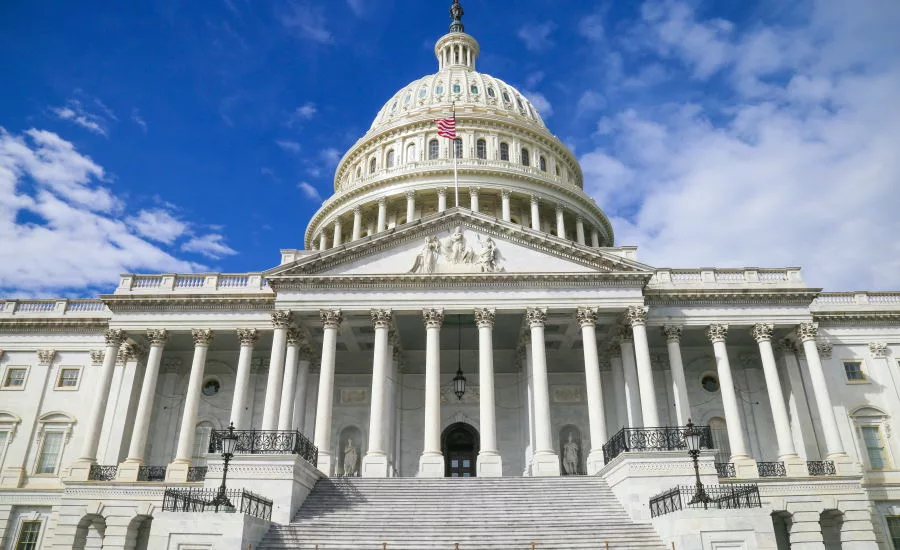Roofing Industry Reacts to the 2020 Election

An election that resulted in the highest voter turnout in over a century will undoubtedly affect the country, and roofing industry professionals and experts are already preparing to deal with the fallout.
The 2020 election was and continues to be one for the history books. Mail-in voting substantially increased due to the COVID-19 pandemic, and as of publication, President Donald Trump has yet to formally concede, instead claiming that voter fraud took place and filing legal challenges in multiple states. Many of these suits have been dropped or dismissed.
As the situation currently stands, former Vice President Joe Biden is the president-elect and will take office in 2021. Multiple sources have confirmed Biden has at least 290 Electoral College votes, 20 more than the 270 threshold needed to win the election. Georgia is undergoing a recount, but with Trump behind by 14,000 votes, its 16 electoral votes are projected to go to Biden, which would bring his total to 306.
“With a degree of certainty, we can say that Joe Biden has won the election fair and square,” said David Hawkings, editor-in-chief of The Fulcrum, a nonprofit and nonpartisan digital news organization, when speaking during a webinar held by multiple roofing associations. “To this point, there has been no credible allegation of more than scattershot voting irregularity, nothing that would come remotely close to potentially changing the outcome of the close states.”
The Senate race was much closer, with Republicans set to retain a narrow majority. Democrats need to flip both Senate seats in Georgia to regain control, but these will be decided in a runoff on Jan. 5. Should they overturn the seats, it would be a 50-50 split of the Senate, the first since 2000.
Republicans also narrowed the majority that Democrats have in the House, leading Hawkings to speculate that people shouldn’t expect a lot of grand, sweeping changes to happen in 2021.
“Joe Biden won’t be looking for touchdowns on long passes, he’s going to be looking to make first down on a three-yard sweep,” Hawkings said. “This is not going to be a year of big, bold policy changes.”
During a webinar with Cotney Construction Law, Craig Brightup, CEO of The Brightup Group and a roofing lobbyist in D.C., said the makeup of the incoming Congress will likely stop any institutional changes from taking place, such as removing the legislative filibuster or increasing the number of seats in the U.S. Supreme Court.
“The Biden presidency, the 46th president of the United States, he doesn’t have a four-year window to get things through legislatively, he has a two-year window, and then 2022 comes, and the hand that he’s dealt and the deck that he has to play with is not going to be as favorable as he has now,” said Brightup.
Trent Cotney, CEO of Cotney Construction Law, said while many are focusing on the outcomes of the presidential and Senate outcomes, one aspect contractors need to be aware of five states voting to legalize marijuana.
“Anytime that happens, if you are a contractor that does work in those areas or headquarter in those areas, you need to make sure that you are engaging in significant training for your crew,” Cotney said. “What we’ve seen, especially if you have a drug-free workplace, that crew don’t understand that they still may test positive. If they’re using marijuana, they don’t understand that they can’t use marijuana on breaks.”
Changes to the U.S. Department of Labor will also impact the industry. Cotney said regardless of who the secretary is for the Department of Labor, contractors are going to see more regulation and additional enforcement as well as additional rulemaking in OSHA, especially in regards to COVID-19.
“We’ve had a favorable administration as far as rulemaking goes, especially in the past couple of years,” Cotney said. “OSHA has taken a lot of heat for not coming out proactively on COVID-19 and kicking it to the CDC to a certain extent. You can expect a lot of that to change.”
Brightup added that contractors can also expect the new administration to have a favorable view of labor unions. He anticipates they will work to modify and change policies to create a favorable environment for union organizing.
Roofing Policy Changes
With all these presumptions in place, the National Roofing Contractors Association (NRCA) is already gearing up to support the roofing industry, including protecting recent tax changes and addressing the workforce shortage.
“NRCA is pleased a vast majority of candidates supported by the NRCA and ROOFPAC, NRCA’s political action committee, prevailed in the 2020 elections,” said NRCA CEO Reid Ribble in a written statement. “NRCA congratulates President-elect Biden and all winning candidates on their victories and looks forward to working with lawmakers in the 117th Congress and the incoming Biden administration to advance NRCA’s policy agenda.”
One of the main items is an additional COVID-19 relief package. Duane Musser, NRCA vice president of government affairs, said the issue is one of the avenues that could help address the industry’s workforce shortage.
“There is and has been proposed funding for workforce training to try to get people off of unemployment rolls,” said Musser. “Both Republicans and Democrats have proposed workforce training funding.”
The NRCA is approaching the labor shortage problem through two other angles as well: proposing expanded support and funding for career and technical education programs in schools and immigration reform. The former of the two often receives bipartisan support, but immigration is expected to remain a divisive topic.
The Trump administration rescinded the DACA and TPS programs that help support immigrants, and while the incoming Biden administration will likely restore them, it indicated it would seek out legislative solutions as well.
“NRCA supported legislation that passed the House in this past Congress that’s ending now that would provide a permanent legal solution for those individuals, many of whom are in our workforce, to stay and get legal status permanently,” Musser said. “We’re looking forward to working with Congress on a bipartisan basis to get that legislation passed in 2021.”
Teri Dorn, NRCA director of political affairs, said she doesn’t anticipate major tax legislation happening unless Democrats gain control of the Senate. Biden has said he would increase the corporate tax rate to 28% on day one, but the Constitution gives Congress the power to set tax policy.
“NRCA supported the Tax Cuts and Jobs Act of 2017,” Tori said. “Biden has proposed raising (the corporate rate) from 21% to 28%, and NRCA is going to continue to protect the lower rate.”
Biden has proposed phasing out the section 199-A deduction for taxpayers making more than $400,000 a year, which affects pass-through businesses. Dorn said roughly 75% of NRCA members are pass-throughs, so the NRCA will support keeping this deduction in place.
The NRCA will also advocate for maintaining the Tax Cuts and Jobs Act’s changes to the estate tax as well as section 179, which allows qualified taxpayers to fully expense non-residential roof improvements under small business expensing.
Future tax issues affecting the roofing industry include tax credits for increased resiliency in residential and commercial buildings, a 30% tax credit for improvements to residential and commercial buildings designed to stimulate the economy, and solar investment tax credit extensions.
Deborah Mazol, NRCA director of federal affairs, said despite the political in-fighting that is certain to continue in Congress, there will be areas of bipartisan agreement, such as infrastructure and the energy sector. Biden’s Build Back Better agenda calls for a $2 trillion dollar package to create jobs in infrastructure, housing, and building construction.
“In the Senate under Mitch McConnell, in terms of infrastructure, they’re likely looking at a smaller, broad package as he and Congress consider how they’re going to pay for legislation,” Mazol said.
Looking for a reprint of this article?
From high-res PDFs to custom plaques, order your copy today!






